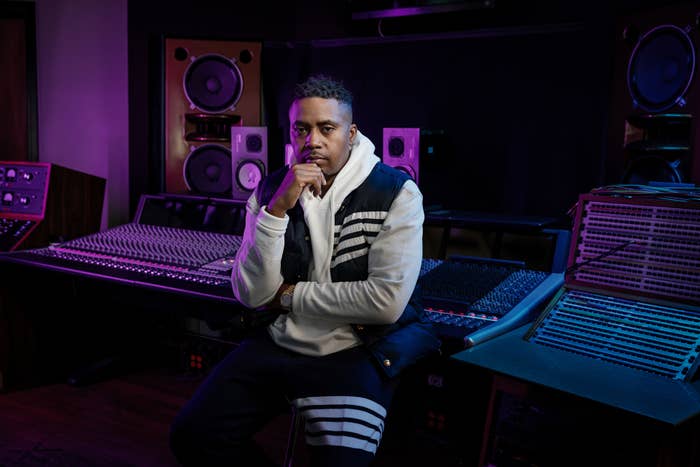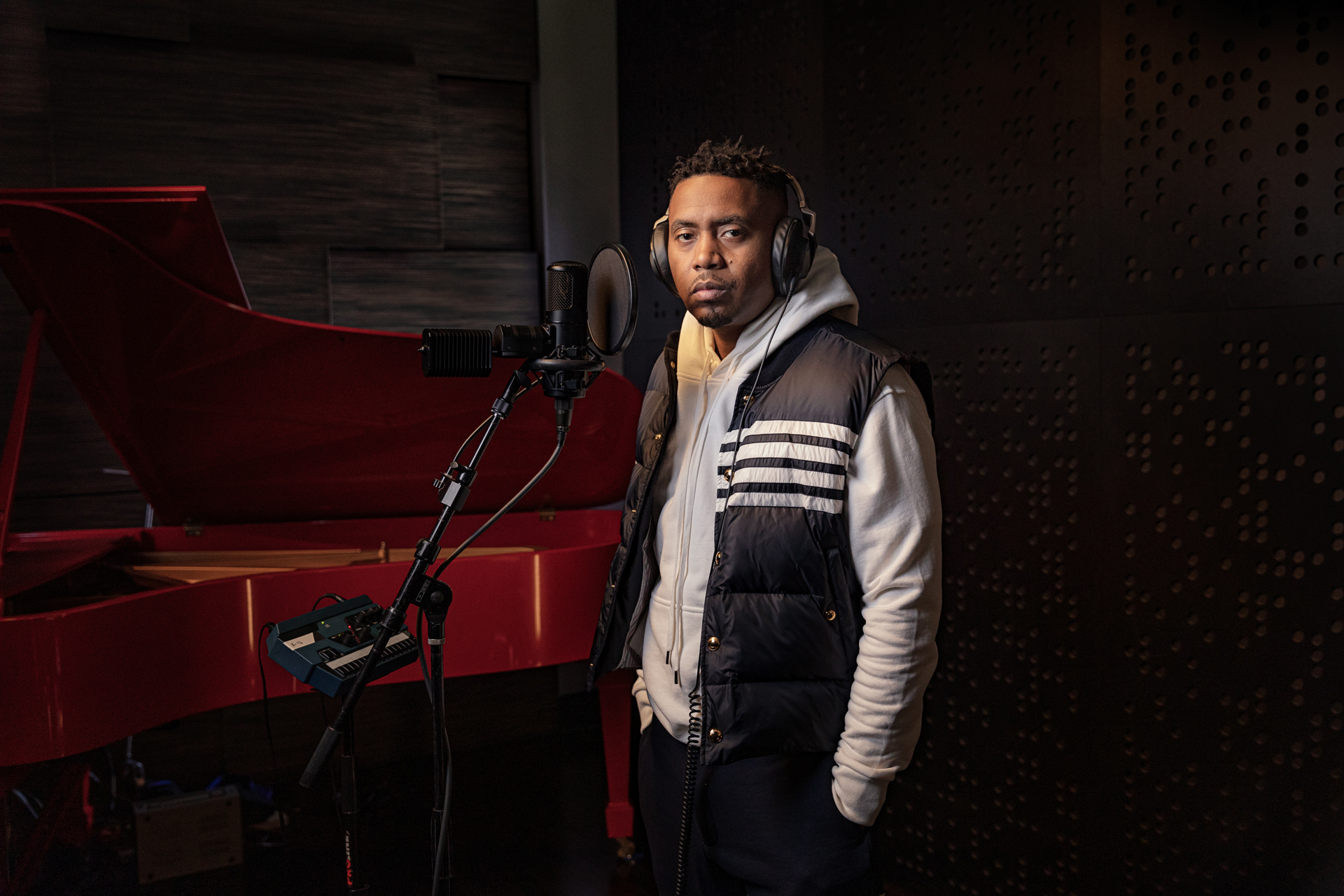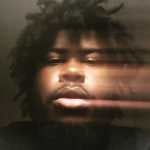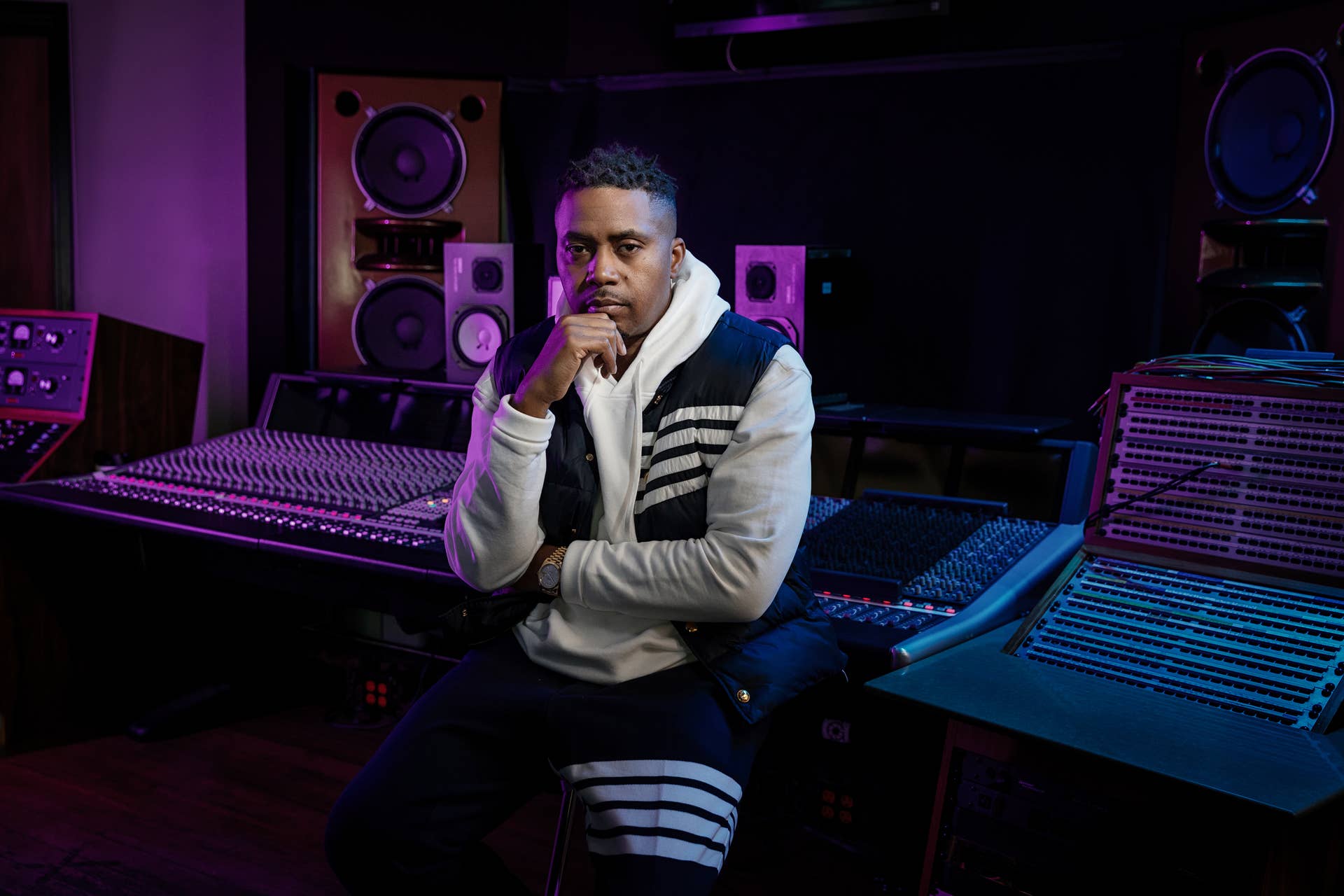
MasterClass, a platform that offers online classes for students of all skill levels, boasts that their instructors are “the best in the world.” And that’s why it made perfect sense for them to link with Nas, one of the greatest rappers ever, and have him teach a class on hip-hop storytelling that will drop on Oct. 14.
Today’s news comes with a new Hit-Boy=produced single called “Big Nas” (Original Song from MasterClass)” as well as a Ben Dean-directed music video for the track. Next week Nas will take MasterClass enrollees through the conception of the song via 12 video lessons, including “Writing an Original Rap Song” and “Recording an Original Rap Song.” He tells Complex that he broke the lessons down “how I would like to receive it from an artist,” and divulges that “each piece gives you more of my life.”
“Nas shares his philosophy as a lyricist, breaking down how he used his life experiences and emotions to create incredibly raw yet cinematic lyrics with a message to inspire MasterClass members to do the same,” a press release states.
Even people who aren’t looking to learn to rhyme might be intrigued to experience the creative process of an all-time great. At 17, Nas was a phenom who is credited with elevating the craft of MCing in the early ‘90s. And at 48, he’s a rap vet showing the 40+ crowd how to age gracefully in the rap game. No one else has that range of experience, which makes this MasterClass more than just a series of lessons. It’s a historical document.
Complex spoke with Nas and Hit-Boy about MasterClass, their chemistry that’s shined on King’s Disease albums, and some of their 2021 highlights. The interview, lightly edited and condensed for clarity, is below.
Nas, you’re doing a MasterClass on hip-hop storytelling. How did the project come together and what were your first impressions of the opportunity?
Nas: MasterClass is a great thing for people to get the inside scoop on what’s going on with artists, producers, actors, and people. I think it’s dope that we take time out of our lives to sit down and think about what it took for us to get here, and think about our journey and share it with people in a way that’s different than we ever did before. I think the whole thing is a great concept.
Have you ever had the idea to do something educational before?
Nas: Yeah, as a music fan, I’m always trying to learn something different about music. Since I was a kid, I was looking up Motown. Berry Gordy owns Motown. What type of person is he? What makes him tick? I wanted to know how a lot of things work in music—not just the business side, it was definitely the music side, too. I wanted to be in the music business and also be able to help people who are trying to get in.
How did working with MasterClass help further the idea of knowledge-sharing for future generations of rap artists?
Nas: I feel like everybody has their own technique. If you take a look at mine, it’s really too much to say in one MasterClass. If you take my technique, I think you’ll find that it might be real similar to yours if you’re a writer. You might see things that you do that are similar or that you didn’t see before in yourself. You might find that I gave you something that could add to what you’re doing, and I think that’s important. I think that’s where we’re at in the business: it’s to share.
“There’s a lot of fans that respect what we did on the two albums that we worked on, and for them to get some type of real inside scoop as to how we actually come up with, I think that’s great information.” – Hit-Boy
What was it like having your creative process filmed for instructional purposes?
Hit-Boy: I thought it was dope. I came in, obviously it’s Nas’ class, and he gave me the opportunity to show how we personally make songs with our chemistry, and I just thought it was dope. There’s a lot of fans that respect what we did on the two albums that we worked on, and for them to get some type of real inside scoop as to how we actually come up with, I think that’s great information.
Nas: Yeah, I agree completely.
How long did it take to make the beat, write the bars, and then record the track?
Hit-Boy: It wasn’t really long at all. I already had an idea. I had created a sample right before I went to New York where we did the class, and just made the beat around that.
Nas: Yeah, Hit whipped it up real quick. It wasn’t even nothing that we really thought of, or I didn’t have any concept or way I wanted to approach it. It was just something that I whipped up right then and there. I think that’s how some of the songs come together, too. Not as carefree, because it was such an environment with the cameras and the fact that Hit already had something put together. I was able to just look at a note or two in my phone and just have fun with it. It was very carefree, and I still got to feel good.

There are 12 video lessons on the course. What was the decision-making process, as far as organizing the curriculum and layout?
Nas: It’s all about giving you what you need in chapters, increments, and giving you the vibe. It’s sort of hard to break it down, so those different classes and different steps make the most sense to me. That’s how I would like to receive it from an artist, so I thought that that’s the way for the person that’s watching it to give them the time to soak it in, each one piece-by-piece. I break it down piece-by-piece, and each piece is different. Each piece gives you more of my life. A lot of it is about my life journey.
There’s also a video coming for the song. Could you speak about the conception of the video and why you thought it would be cool to augment this track with it?
Nas: It’s just to give MasterClass all that I can give. I wanted to give it 100 percent, so the video concept was, since King’s Disease 2 is already out and MasterClass is something totally separate, I wanted it to feel like its own thing. I wanted MasterClass to be MasterClass and King’s Disease 2 to be King’s Disease 2. Two different things altogether. So the video for the song has its own style. I didn’t want to do a performance. I didn’t want to do what I would do for King’s Disease stuff, but I had to take a different approach. Since you didn’t see it, I don’t want to give it away, but it’s different than anything I’ve ever done.
Y’all displayed dope chemistry in the lessons I saw, and you’ve been working together for the past several years. How long did it take to gain that chemistry in the studio?
Hit-Boy: I feel like every song we make, without even consciously doing it, we’re trying to make it better than the last. It’s just already embedded in us to do that. I feel like as long as we keep taking that approach, it’s going to get crazier and crazier, and that’s what happened. I keep seeing every day like, “Damn, how would y’all top KD 1 that y’all won a Grammy for? This is even better.” That’s a good feeling, and it lets me know that the chemistry is legit. I feel like we caught it quick. Like, the first day we came through, we recorded “All Bad,” and that made KD 1.
“In a world full of so much craziness, you got to keep your head in the light, and that’s what I’m doing. No matter what, I’m going to stay in the light.” – Nas
Hit-Boy, can you talk about evolving from a beatmaker to a producer, as far as going from just making beats to being able to suggest to an artist how to craft their vocals? How long did that take, and how did you get better at it over time?
Hit-Boy: I started making beats at 16, and I’m 34 now, so I’m 18 years in of consistent, nonstop work. There’s times where I legit feel myself grow. I’m like, “Damn, I’m way better than I used to be.” That’s the feeling that I’m always chasing, when I’m leveling up with the music. Within the last five years is when I super set out to be able to make good songs, and not just beats.
I was always making songs, but I was really having to tap into it. I ran into a producer when I was working at a studio, an older guy, and this was maybe 2014. He told me, “In order to stay in the game as a producer, you have to know how to produce the vocals as well. It’s not just about the beat.” The minute I heard that, I just became super focused on just trying to make sure every song is good, on top of the beat, as well as the instrumental.
Nas, you’ve been open about your inspirations, like Rakim, MC Shan, Kool G Rap, and more. Who are some of the first people who helped you hone your craft as a lyricist and help you learn your first rhyme techniques?
Nas: It was all of those guys. It was all of those guys who were showing me where to go with it until I found my voice. When I came up, I was listening to everything that was out, and I had to find my voice because I knew if you don’t add nothing new to the game, you’re not even going to last more than one year, more than one song, more than one single, or more than one album. I knew that was coming, and that’s what kept my energy up for writing songs, because I was hearing it on each thing I wrote. I was hearing more of me, and by the time that I got into the business, I was ready to go. From there, I found myself in new territory where I’m the new sound, and I’m the new vibe. I’m the new wave, and I had to figure out how to complete albums at that point, because I hadn’t seen me before. It was all fresh from the heart, so I was just going and going and got to a place where I was good.

What is a MasterClass that you’d like to take from anybody about anything?
Nas: Going off of what I was just saying, I come from a day and age where you had to find your own voice. Now, no knock to nobody, because everybody is doing dope things, but I think now you have to sound like somebody else. It’s the complete opposite, and that’s how things change. The tables always turn and things change, so they don’t become mundane. It changes for the good or the bad, but now is a point where a lot of artists feel like they need to sound like what’s hot. They did that back then, it’s not just now. A lot of people popped off from sounding like other people, it just didn’t last as long.
So in my MasterClass, I come from that era of having to completely have your own sound, voice, and everything, and to have a career with that and not just one album. And to do things where I also adapt slightly from what’s happening today, because to me, that’s dope. So to adapt some of it and connect something else on a hybrid level of you on the next level. My MasterClass, you get the journey of my style from the early 90s to now.
Hit-Boy: Man, I would like to see how Quincy Jones made Thriller. That would be crazy to see all those songs broken down and explore the things behind the instrumentals and all that.
Nas, I saw you received the Key to Queens last week. How do you feel about that honor?
Nas: I’m super honored by it. When you look back and think about humble beginnings, and you realize how much you’ve been putting in… It’s a great county. It’s a great town. You know, “Queens gets the money,” that’s a real statement. That goes back from when I was a kid in the ‘80s watching very inspiring people, to now very inspiring people are doing great things. We just have a style about ourselves in Queens. We’re thinkers. So, to have that honor in 2021 and have my own day, Sept. 23, makes me feel great. It makes me want to do something more.
“DMX always wanted to do part 2 [of Belly]. I think Hype Williams was a little hesitant for whatever reason, but X always wanted to do it. Every time we saw each other, we would talk about it.”
In the ’90s and 2000s, did you ever think about what aging in the rap game would look like for you? And has it happened as you thought it would?
Nas: Yeah, I had to, because I was buying everybody’s tapes and CDs, so I was checking out everybody’s cover and checking out what they’re doing and how they’re keeping it up, because what’s on you represents what’s in your head sometimes. If you look like a mess, then your head is a mess sometimes. And also it’s art, and with your physical, it was all about taking care of yourself physically and making sure you’re staying stress-free. In a world full of so much craziness, you got to keep your head in the light, and that’s what I’m doing. No matter what, I’m going to stay in the light.
On “Big Nas” you reference the late DMX. You had the song with you, him, and Jay-Z on his Exodus album. How did that track come together from your perspective, and how powerful is it for you to be with those greats on that album?
Nas: That was something me and Swizz [Beatz] was working on a while ago. He had put together this record, but we didn’t have a place for it, because I had released a record while he was still working on the new album and we never completed it fully until the album was done. So there was no placement for it, and X was on it, and Jay was on it, so it was just sitting and waiting for the right opportunity. And I guess that’s what X wanted. X wanted the record, so it was his.
I had to fix some stuff because I had used some of the lyrics on that song on one of my albums. So I punched it up a little bit and took those lyrics off so that the whole verse was fresh to people. X is my guy. We were brothers, so I was more than happy to be on his album. We had a fresh song that we did together while he was alive called “Walking In The Rain.” I just had him heavy on my mind when me and Hit was in the studio, so that’s what it was.
Jay-Z recently spoke about the ferocity of X’s live performances and the challenge of going on after him. Could you speak on one of your fondest memories of DMX?
Nas: I would be in the city, and X would be there and just pull up on me. At concerts, somebody would let me know X was there, and it would just be a great time. Sometimes he would come out onstage, sometimes he would just be outside and just watch me rhyme, and sometimes we were on the same bill. Either way, we got that time to talk about life, family, love, women, ex-wives, new girlfriends, new potential families, new deals, new business, new plans, and we talked about doing another Belly. We did a lot when we saw each other. We made sure we got that time in. It wasn’t like a hi-and-bye, it was like, “Nah, what we doing?” It was a moment. Whenever we seen each other, we both was parked until we was done talking.
I’ll give you a better story. One day, I was at a show in Boston, and backstage he was there. He just happened to be in Boston, so he came through. He played a song that was on his album, “Letter to My Son (Call Your Father)”, which is incredible, about his oldest son. It meant so much to him and he played it for me. Immediately, I was like, “This is one of the deepest rap songs I’ve ever heard, but the world is about to hear it when he put it on his album.” That was a moment, and it was about a year or two years before he passed. The song was still a work-in-progress.
You mentioned that you both were in talks to potentially doing another Belly. Did that ever become more than just talk?
Nas: X always wanted to do part 2. I think Hype [Williams] was a little hesitant for whatever reason, but X always wanted to do it. Every time we saw each other, we would talk about it, because he does so well in movies. But he wanted to do that, and so did I.
Will we see more Nas and Hit-Boy projects down the line?
Hit-Boy: Yes, it’s a must on my end. I feel like the challenge of outdoing ourselves, I feel like it’s only getting better every time we create, and I’m just looking forward to seeing what that’s going to bring our way.




